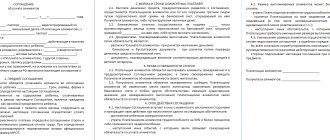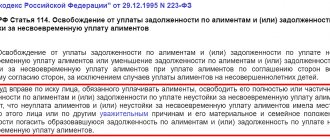Legal basis
At the level of the Constitution it is stated that mother and child are under state protection. Part 2 art. 38 of the country's basic law obliges parents to participate in the development and maintenance of their children (except in cases where the mother or father is deprived of the rights to raise the child). Codified law on family relations in Art. 47 defines the moment of certification of information about the mother and father in the registry office as the beginning of the emergence of parental rights and fulfillment of duties.
It is important to know! Confirmation of consanguinity voluntarily outside of a registered marriage is made upon the joint application of a man and a woman when registering the birth of a baby, as defined by Federal Law No. 143 in Art. 17.
The legal framework regulating the relationship between parents and children, the rights and opportunities of minors in the period before, during and after determination of paternity, are fixed by the Family Code:
| Art. 49, 50 | They regulate the procedure for establishing the relationship between father and child through the court in special cases - after death or when it is impossible to accept the voluntary will of the father. |
| Art. 53 | Indicates the unshakability of the rights of children born in an extramarital affair. |
| Art. 80 | Obliges the mother and father to agree on child support issues based on an agreement or through litigation. |
| Art. 81-83 | They formulate the volume of child support payments and name the financial base from which money for the maintenance of minor children can be withheld. |
| Art. 85, 86 | Parents are forced to provide financial support to their child in difficult life situations in case of emergency (injury, trauma, treatment). |
| Art. 99 – 105 | They inform about the peculiarities of the voluntary implementation of alimony obligations, fix the amount of maintenance and the conditions for its payment by agreement of the parties. |
| Art. 106 – 120 | They educate about the judicial procedure for establishing alimony obligations, regulate the obligation to pay alimony and about exceptional cases when the transfer of money can be stopped. |
If one of the parents refuses to follow a court decision that is immediately binding in accordance with Art. 79 of the Family Code of the Russian Federation, for which the use of additional coercive measures is provided at the legislative level. In this case, guardianship authorities, representatives of the law enforcement system and bailiffs are involved.
How is the amount of payments determined?
In the absence of an agreement on voluntary alimony payments, such payments are collected as a percentage (share) of the payer’s total income or in a fixed form. The amount of the penalty is:
- for 1 child - ¼ or 25% of income;
- for 2 – 1/3 or 33.33%;
- for 3 or more - ½ or 50%.
Important!
The amount of recovery is often increased or decreased by the court, based on the financial well-being of the participants in the process and other objectively significant circumstances. Attention! If the potential alimony payer does not work or has variable, periodic income, then it is better to ask the court to establish payments in a fixed form. Or in an alternative variation: indicating both methods of collection. When issuing a judicial act on alimony in fixed terms, payments are determined based on regional indicators of the minimum wage and the child's subsistence level.
Instructions for establishing paternity in a claim proceeding
A woman who is not legally married to the biological father of her child is recommended to take the following steps to establish the origin of the child and subsequently assign the alimony maintenance required by law:
- Establishing a constructive dialogue with a former cohabitant, an attempt to initiate voluntary recognition of paternity and conclude a child support agreement at the pre-trial stage.
- Writing a statement of claim to the court according to the standards provided for by the Code of Civil Procedure of the Russian Federation.
- Collection of evidence confirming the blood relationship between a man and a child.
- Transfer of the claim and documents to the court competent to resolve civil disputes about paternity. Proceedings on issues of establishing paternity and collecting alimony are carried out in district courts in accordance with Art. 24 Code of Civil Procedure of the Russian Federation. The mother of the child has the right to choose a court at her own discretion - based on the defendant’s residential address or according to her registration (Article 29 of the Code of Civil Procedure of the Russian Federation).
- Obtaining a court ruling to accept the claim for consideration and to set a date and time for the first hearing.
- Direct personal participation in the process, clarification of claims, attraction of documentary evidence and witnesses.
- Conducting additional examinations at the request of the court, obtaining the necessary conclusions.
- Familiarization with the court decision.
- Making changes to the child’s birth certificate when visiting the registry office.
- Requesting the help of the bailiff service to enforce a court decision in the financial part.
In his activities, the judge is guided by Art. 67 of the Code of Civil Procedure of the Russian Federation, recognizing all relevant evidence as worthy. The decision is made based on the internal convictions of the court, the volume of proposed documentary information and the testimony of witnesses.
Preparing for trial
Forcibly proving paternity and filing for alimony is permissible only in court. The plaintiff and defendant need to prepare for proceedings, which will continue for 2 months from the date of registration of the application in accordance with Art. 154 Code of Civil Procedure of the Russian Federation.
Claim in court according to the norms of the Code of Civil Procedure of the Russian Federation
When writing a claim, you must be guided by the requirements of Art. 131 of the Code of Civil Procedure of the Russian Federation, it sets out the main elements of the structure of the application form. The child's mother must fill out the form as follows:
- Name of the court;
- Personal information about the plaintiff and defendant in the case, indicating registration addresses;
- Amount of claims;
- Title of the application;
- Description of the current situation;
- Requirements to the court;
- Legal norms on which the plaintiff relies when forming claims;
- Full name and registration address of witnesses;
- An application indicating documentary evidence of the plaintiff’s words;
- Date and signature of the applicant.
A citizen’s claim will be refused if the provisions of Art. 134 Code of Civil Procedure of the Russian Federation:
- Wrong choice of court;
- Inappropriate application form;
- There is already a decision in the case, the circumstances of which are set out by the plaintiff.
The text of the statement of claim must be concise and formatted in an official business style. It is preferable to contact the court with the requirements set out in printed form.
Necessary documents and evidence for court
According to the contents of Art. 132 of the Code of Civil Procedure of the Russian Federation, the mother of the child must attach to the statement of claim the following documents according to the list:
- Written and oral evidence supporting the claims of the child's mother;
- Receipt for payment of the state fee for the trial;
- Financial calculations of the amount of alimony payments that must be recovered from the defendant;
- Documents certifying the fact that other participants in the case have received copies of the statement of claim and the plaintiff’s demands.
Important! Changes made to federal legislation in 2020 oblige the parties to the conflict to strive to resolve the dispute out of court. Before filing a claim, the child’s mother must confirm information about attempts made to conclude an agreement with the man to establish paternity and determine alimony.
Collection of alimony through court
If it is simultaneously necessary to recognize paternity and collect payment for the maintenance of the child, then if the case is won, alimony is assigned by the court from the day the claim was registered in the court office.
The amount of alimony may be as follows:
- The percentage of earnings established by the RF IC is: 25% for 1 child, 33% for two, 50% for three or more.
- A fixed amount – if the defendant is unemployed, an individual entrepreneur or does not have a permanent income. In this case, the court determines, at the request of the plaintiff, to the nearest ruble, how much will be transferred monthly.
- Transfer of expensive property. The defendant may, for example, transfer to the plaintiff the housing he owns, the proceeds from the sale of which will be used to support the child.
Arbitrage practice
When analyzing Russian judicial practice, it is worth noting that a significant part of the cases being considered to determine paternity and establish child support are resolved in favor of single mothers and in defense of the rights of minors. Exceptions are situations where the plaintiff was careless in the selection of documentary evidence and testimony.
If, in the opinion of the court, the evidence attached to the claim and the information heard from witnesses is not enough to make a fair decision, in accordance with Art. 79 of the Code of Civil Procedure of the Russian Federation, a medical genetic examination is prescribed. Participation in the research must be voluntary for both the plaintiff and the defendant. Evasion from conducting an examination, Part 3 of Art. 79 of the Code of Civil Procedure of the Russian Federation is interpreted against a person who interferes with the establishment of the truth through medical manipulation. The court accepts the evidence of the second party in its entirety and makes a decision in its favor.
An example from judicial practice. Sorokina E. filed a statement of claim in court against Surovtsev E. with demands to establish paternity of her minor daughter and to recover the amount of alimony payments. In essence, the plaintiff said that she lived for some time in the same territory and lived together with the defendant without concluding an official union. After the onset of pregnancy, Surovtsev E. refused to recognize the relationship with the child and register the emergence of parental responsibilities after the birth of his daughter. By her mother's decision, the minor girl received her surname. Information about the biological father was not stated on the birth certificate. Before Sorokina E. went to court, the father did not participate in raising the child and did not provide financial support. The fact of cohabitation between the plaintiff and the defendant is confirmed by the testimony of witnesses in the case. Surovtsev E. refused to appear at the court hearing and did not give permission to conduct a DNA examination. Guided by the provisions of the law on the rights of the child, set out in the Constitution, the Family Code, the Federal Law “On Acts of Civil Status”, in defense of the interests of a minor girl, the Rudnyansky District Court decided to recognize E. Surovtsev as the father and collect alimony from him (Decision of the Rudnyansky District Court of the Smolensk Region dated 08/07/2019 in case No. 2-342/2019).
To avoid the court making a refusal decision, the plaintiff must:
- Agree to conduct a genetic examination at the request of the court;
- Attend all court hearings;
- Present all possible evidence relevant to the situation under consideration.
The operative part of the judicial act does not confirm the establishment of paternity in the event that the child’s mother withdraws the statement of claim or in the absence of a blood relationship between the man and the child, as evidenced by the conclusion of a genetic examination.
Is the deadline indicated in the regulatory legal acts?
According to the current acts, the designated term refers to the period of time established for initiating proceedings in order to protect one’s rights. After the allotted time has expired, it becomes impossible to submit claims to court. It is worth noting that this parameter is inherent in property relations.
For alimony, there is no period for filing a claim. This is confirmed by current legal acts. Thus, a citizen who wants to report a violation of a child’s rights can do so without time restrictions.
Important! If a citizen refuses to help his child financially, those responsible for raising the minor may initiate proceedings in court. Not everyone has this opportunity. Thus, the claim is filed by the spouse with whom the child lives, the adoptive parent, guardianship authorities, guardians, and adoptive parents.
Sometimes a person who has the opportunity to receive money forgets about this opportunity. After several years, the desire arises to receive the entire amount due to him at once. However, judicial practice has developed a number of rules according to which such a request can be granted. These include:
- The plaintiff’s desire to receive payments and the defendant’s evasion of his duties. An applicant who wants to collect alimony from his ex must prove to the authorities that this is not the first attempt. The court will agree to withhold the entire amount only if the defendant turns out to be a malicious evader whose behavior is motivated by personal gain.
- Lack of bilateral agreement. The person who filed the claim may receive the amount of payments for the entire period, if the partners have not concluded an agreement regulating the conditions and procedure for collection.










